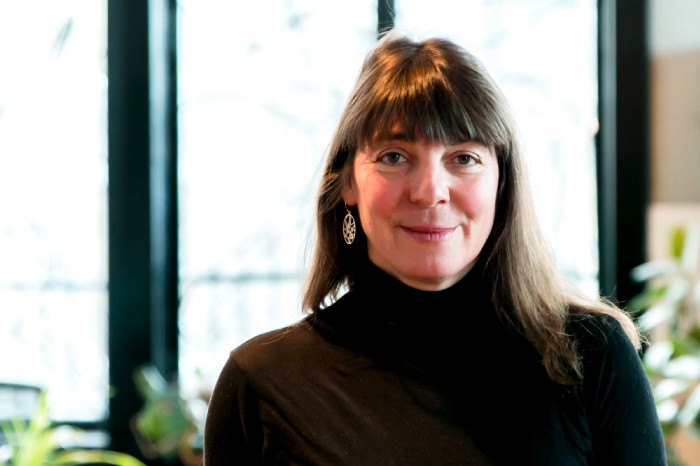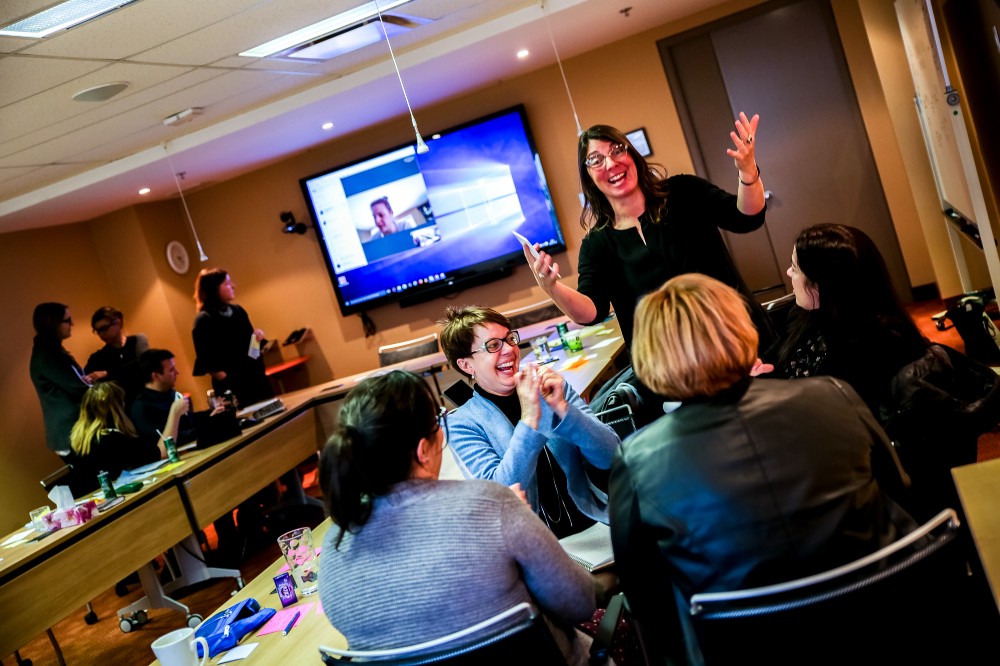Move away from toxic hierarchy for good by Going Horizontal.
It all started as an experiment.
“Our goal was to experiment radically, to find new ways of being and working together.”
Samantha Slade — a force-of-nature with a background in cultural anthropology and education — co-founded Percolab, an international co-creation and co-design firm in 2007. “We were a group of social scientists and business people. The idea was to create a lab, explore future ways of working, and put a theoretical framework around it.” And so they did. Percolab has expanded internationally and kick-started a movement to change the way businesses organize.

Slade’s book Going Horizontal — Creating a Non-Hierarchical Organization, One Practice at a Time (BK Publishers) boldly makes the case that “hierarchy in organizations is obsolete” and presents 7 concrete practices to help organizations flatten their structures. She tours the world, providing practical training sessions to help businesses large and small, emerging or established, industrial or high-tech to reimagine how they work together.
“We need to unlearn behaviours to reconnect with healthy habits.”
If we think about our personal relationships, they are equal, adult-to-adult partnerships. We don’t let friends tell us what to do and if they try, the friendship becomes strained. “In our personal lives we know how to show up in egalitarian ways,” says Slade. “For some reason in the work realm we pick up hierarchical structures left over from the industrial era.” This vertical culture puts the boss at the top, responsible for solving problems and making decisions (like a parent) and the employee accepting these decisions unquestioningly (like a child). It becomes difficult for team members to work to their full potential, who instead find themselves feeling trapped.
“Let’s create more collaborative, conscious humans who can show up fully.”
If you want your team to show up inspired and enlivened, ask yourself ‘how am I showing up in my personal leadership?’ Examine your own vertical habits. Slade says there are non-hierarchical practices you can start integrating into your personal or professional life today. “You can develop your skills quietly until you find ease and nuance. You don’t need to tell anyone or ask anyone’s permission.” For example, there is nothing to stop you from asking your team to give you feedback. “What do you appreciate about how I did that? How could I amplify that?” Start rewiring the way you interact with your team.
“Deep transformations come from small practices.”
Micro practices are integral to Slade’s work with clients because they are simple to learn and can be applied by anyone in an organization. “They are inclusive to anybody and everybody who may be feeling that the way things are isn’t working.”
Checking In
How do you show up for meetings? Once everyone is seated, do you jump right into the agenda? Next time, try checking in with each person at the table and asking how they feel about the task at hand. Invite everyone to share their feelings about the project and witness each other, without discussion. “This surfaces the team’s emotions and brings rich information into the group,” says Slade. “The meeting will be more on task, more relevant and more in flow.” The meeting room becomes a safe space to share and disengaged members are invited to join.

Collective time
Slade contrasts team meetings with the discussion you might have with a group of friends while planning a holiday. Everyone shares ideas, offers to take on tasks. There is energy and excitement. How do you invite that energy into your next team meeting? “Try inviting anyone at the table to put a point on the agenda,” says Slade. “This micro practice sets a completely different tone from the moment the meeting begins.” Invite each person to assign one of four categories to their agenda item: 1. Information — you listen to me, 2. Feedback — I listen to you, 3. Co-create — we all do something together, 4. Propose — we all make a decision together. Each team member self-attributes a set amount of time to get through their item and becomes accountable for running it through. “This small switch changes everything,” says Slade. “The meeting becomes collective time where everyone is empowered to contribute. I find people start showing up kindly and caring for one another, even sharing some of their time with someone else’s agenda item if something pertinent is going on. It really creates a feeling of mutual support and solidarity among the group.”
“But we’ve never done that before…”
About now you are probably picturing the nay-sayer at the table. We can all picture someone from our work environment who resists change and who is comfortable with the status quo. Slade recommends first trying out these micro practices in “safe spaces at work where there is trust and wiggle room.” Maybe it is with a smaller team, or with a group where trust already exists. “Once you have lived it and felt the value, you won’t show up the same way when you face that nay-sayer,” says Slade. “You will totally own it and will be totally confident in the impact the change can have.” As your skills are rewired you can take them into more high-powered situations.
Adding a barista won’t fix it.
Internationally, up to 85% of people don’t show up engaged with their work. There is a groundswell of freelance workers who don’t want to work in the traditional setting. College graduates won’t commit to traditional organizations. This is a systemic issue that is not going away. “The current way we set up and run our organizations will not carry us through,” says Slade. “As humans our default is to operate as a community, it is in our nature. We want to be respected as equals and that is difficult when one person acts as the boss of the community.” To make matters worse, there are not many models out there. As one of Slade’s emerging and rapidly growing clients expressed: “If we don’t go intentionally and with care we will end up with a hierarchical modality by default.”
More collaboration
Applying these simple micro systems yields meaningful, transformational change. Clients come to Slade because they want to plan strategies differently. What they often discover is that much of their team is not working to its full potential. When they are invited to collaborate, a new energy is unleashed into the organization. “They learn to work collaboratively and efficiently in an enlivening way that can carry them forward. It doesn’t feel like a compromise, there is courage and strength in the work and it is no longer getting diluted,” says Slade.
Practice in a safe space.
Samantha Slade and her colleagues regularly guide highly practical, immersive training sessions on these micro systems. In these sessions, participants have the opportunity to practice and hone their skills. “The specific practices will be decided by the participants,” says Slade. “Individuals will even say who they would like to have facilitate each practice by inviting others or stepping up themselves. So much power will be given over to the participants.” You will leave with a shared vocabulary of the 7 domains of practice: Purpose, Meetings, Decision Making, Transparency, Autonomy, Learning & Development, Conflict and Relationship. The training is a safe space where all will be comfortable trying out new things without judgment. “They will leave having shared a collective experience and feeling the shift that this makes.”Find an upcoming session here. This blog has been written by my good friend Sue Wakefield. Thanks Sue!

